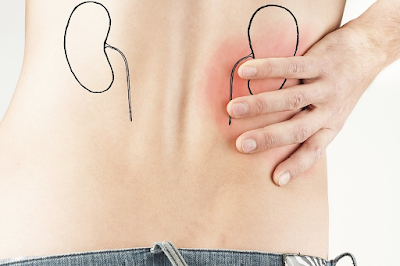What is chronic kidney disease?
Kidney disease
(also called renal disease) is a general term for when the kidneys are damaged
and do not function as they should. If you have kidney disease that lasts for
more than 3 months, it is called chronic kidney disease (CKD).
When the kidneys
do not work properly, wastes and fluids build up inside the body. Chronic
kidney disease can lead to other problems like heart disease and high
blood pressure and eventually complete kidney failure, so getting
treatment early is vital.
What are the symptoms of
chronic kidney disease?
Kidney disease is
sometimes called a 'silent disease' because there may be no warning signs. In
the early stages, you will probably not have any symptoms.
As kidney disease
progresses, you may start feeling unwell. Symptoms of the middle and late
stages include:
- high blood pressure.
- changes in the amount and number of
times you pass urine, such as waking up in the night to urinate.
- changes in how the urine looks (such
as frothy or foaming urine).
- blood in the urine.
- puffiness in the legs, ankles or
around the eyes.
- pain in the kidney area.
- tiredness, lethargy.
- loss of appetite.
- headaches.
- poor concentration.
- itching.
- shortness of breath.
- nausea and vomiting.
- bad breath and a metallic taste in the
mouth.
- muscle cramps.
- pins and needles in the fingers or
toes.
- restless legs.
- generally feeling unwell.
What causes chronic kidney
disease?
The most common
cause of chronic kidney disease is diabetes. This is because high blood sugar
levels damage the blood vessels in the kidneys, stopping them from filtering
wastes properly. About 4 in 10 cases of chronic kidney disease are caused by
diabetes. Chronic kidney disease caused by diabetes is also called diabetic
nephropathy.
High blood
pressure can also lead to kidney disease. So can glomerulonephritis, an
inflammation of the kidneys that can either be inherited or follows an
infection.
Other things that
contribute to people getting chronic kidney disease are:
- having heart failure, or having had a
heart attack or stroke.
- having kidney disease in the family.
- being overweight or obese.
- smoking or having ever smoked.
- being over 60 years.
- a kidney injury, infection or cyst in
the past.
The kidneys can
also be damaged by misuse of some painkillers, prescription medicines and
illegal drugs.
What lifestyle changes can
you make?
Chronic kidney
disease will gradually get worse but there is plenty you can do to slow the
progression and improve your quality of life. Changes you should make include:
- stop smoking.
- eat a healthy diet. That means
eating a variety of vegetables, fruits, wholegrain cereals, lean meats,
poultry, fish, eggs, nuts and seeds, legumes and beans and low-fat dairy
products. Make sure you limit salt to less than 6g a day and limit your
intake of saturated and trans fats. In the later stages of chronic kidney
disease, you may need to follow specific instructions from your doctor on
what you can eat or drink.
- maintaining a healthy weight. If
you have chronic kidney disease, you should ideally have a BMI of 25
or less.
- limit alcohol to less than 2 standard
drinks a day.
- be physically active on most,
preferably all, days of the week. Aim for 150 to 300 minutes of moderate
or 75 to 150 minutes of vigorous physical activity each week, and make
sure you do some muscle strengthening exercises.
- take medicines to treat high
blood pressure, diabetes, high cholesterol or other underlying
conditions.
If you are being
treated for chronic kidney disease, your doctors may need to change other
medicines you are on, since many medicines can affect the kidneys, such as
blood pressure drugs and anti-inflammatories. Some medicines which leave the
body through the kidneys may need to have their dose adjusted.
Can chronic kidney disease
be prevented?
There is plenty
you can do to help keep your kidneys healthy and help prevent kidney
disease.
- watch your weight - being
overweight increases your risk of diabetes and high blood
pressure, which in turn increases your risk of kidney disease.
- eat healthily - a diet high in fruit
and vegetables and low in salt, sugar and fats is best.
- drink plenty of water - avoid sugary
drinks (such as soft drinks).
- exercise regularly.
- do not smoke.
- limit your alcohol intake to
less than 2 standard drinks a day.
- find ways to help you relax and
reduce stress.
- be aware of your risk factors - if you know you are at risk of kidney disease, you can have your kidneys checked regularly.
As usual, we remind you to take your Memo Plus Gold daily. It will help to keep you alert and mentally sharp. For more information or to order for Memo Plus Gold, please visit : https://oze.my.




No comments:
Post a Comment
Note: Only a member of this blog may post a comment.